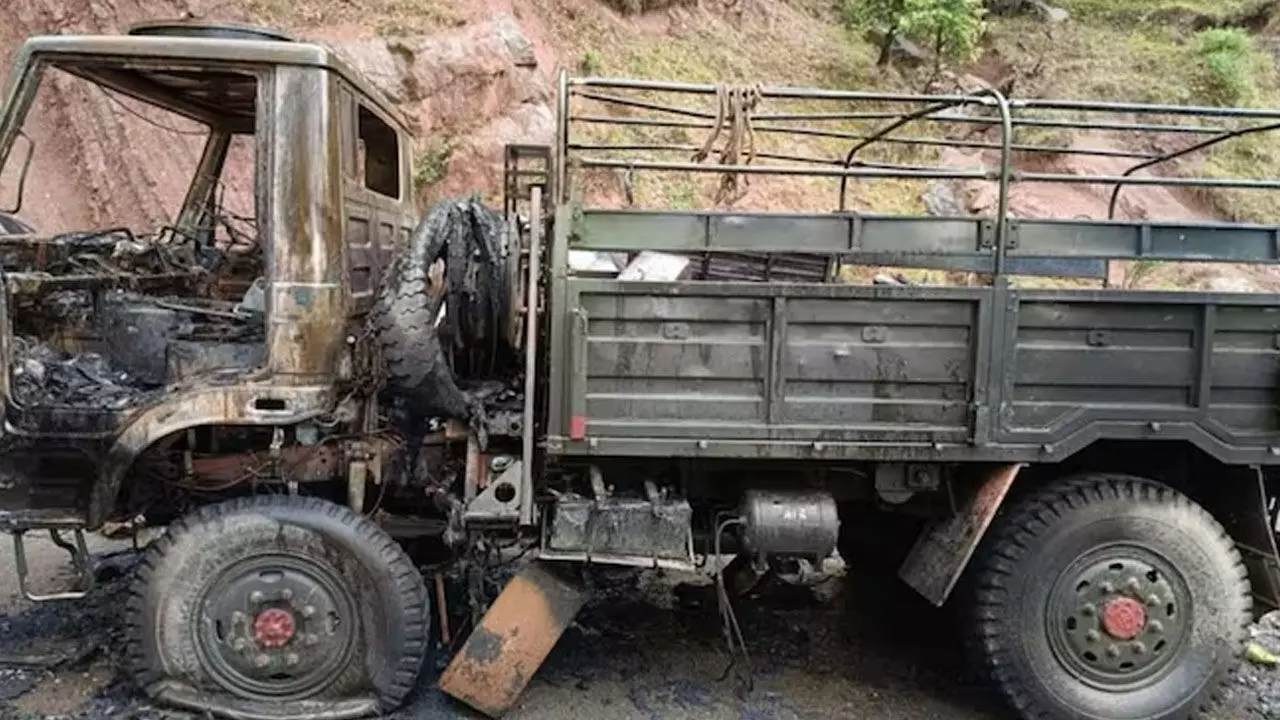No end to terror?

The attack on an Army truck on April 20 in the Rajouri-Poonch sector, which killed five soldiers and injured one, reaffirms the fact that the terror scenario in the valley has come back to square one, like always. The images of the patrol vehicle set ablaze grimly reminds one of the dastardly Pulwama attack and many others. Thus far, the identity and affiliation of the involved terrorists have not been ascertained. The terror incident is yet another expression of the vile obsession of Pak-based terror groups with what can safely be called a part of sovereign India. It is unfortunate that despite being absolutely condemnable in a world order that celebrates democracy and sovereignty, such terror acts continue unabated, with tacit state support. Broadly speaking, there is a pattern that such terror attacks follow. More often, the terror incidents precede high-profile visits of dignitaries from one of the two nations to the other, or when there are some signs of comparative smoothening of ties. It is a well-established fact that such disruptive interference in India’s sovereignty, amid fluctuating bilateral relations, have been continuing for a long time. In the present scenario, the attack on Army’s patrol vehicle has come ahead of a G-20 Tourism Working Group meeting, which is to be held in Jammu & Kashmir. Also, Pakistan’s Foreign Minister Bilawal Bhutto Zardari is expected to attend a Shanghai Cooperation Organisation (SCO) meeting in Goa. The announcement of the upcoming meeting had stirred the chances of softening of long-strained Indo-Pak relations, but now, a bitterness would be hard to avoid even if the meeting occurs. Time and again, dialogues have proved to be futile. Apart from headline condemnation of Pak-triggered terror on the Indian soil — that too far and few — there has been little mobilisation and sensitisation on the international front. For prominent crusaders of democracy and sovereignty, the India-Pakistan rivalry is something that can be cashed upon for their own advantage. The instability factor in the South Asian region doesn’t appear significant enough to move the soul of the Western blocs. It may be clarified here that India doesn’t seek intervention of foreign parties. However, since terrorism is a global phenomenon, all parties can be expected to expedite the process of limiting this highly lethal menace through strong and stern frameworks. Irked by the futility of dialogues and almost non-existence of global coordination, India, going against its very nature, even tried retaliating through aggressive acts. Following the Pulwama attack, in which 40 Central Reserve Police Force (CRPF) personnel were killed, India fired fighter jets across the Line of Control to strike JeM training camps, killing terrorists and destroying their camps. The high-profile attack was carried out with pomp and show, and attracted, unsurprisingly, international fame/notoriety. A strong message it was to Pakistan, but that, too, did little to improve the situation on the ground. Though terror groups, including JeM, did not do anything stark in retaliation, they kept carrying out small-scale but more frequent infiltrations, causing damages with less expenditure without attracting much media glare. Furthermore, the abrogation of article 370 and re-organisation of Jammu & Kashmir were seen as moves that would bring stability and prosperity in the region. However, the administrative changes that occurred after the reorganisation haven’t proved very effective in controlling terror in the valley. Violence, perpetrated by both terrorists and militants, remains an issue of concern. So, neither dialogues nor aggressive strategies have proved to be effective in taking Pakistan onboard towards controlling the terrorism menace. More worryingly, India’s decision to stay aloof has also not paid the desired dividend. The search operation for the attackers is in full swing. One hopes that the culprits will be brought to books. But a still greater challenge awaits India — to bring peace and stability in Jammu and Kashmir. The best way forward could be active and practical engagement with Pakistan in multiple spheres. The Indo-Pak peace process cannot be based on wishful dialogues of principles, promises and morality. Through a multitude of engagements, India can create a set of balanced interdependencies that can be leveraged to put a tab on Pak-triggered terror. The dark spot of terrorism needs to be surrounded by so many whites that it fades into insignificance. That might be a lengthy process, but there is hardly any unexplored alternative.



